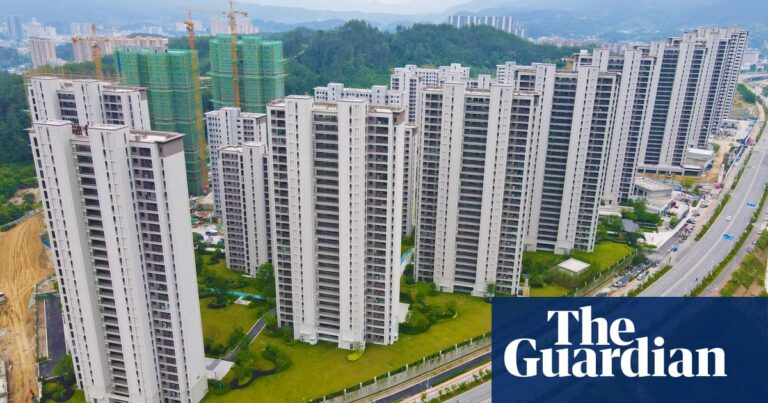Across China, from Beijing in the north to Shenzhen in the south, millions of newly built homes are sitting empty. According to the National Bureau of Statistics, as of April, there were nearly 391 million square metres of unsold housing in China – an area equivalent to the size of Manchester and Birmingham combined, and even more.
This glut of idle property is causing headaches for the government, destabilizing the world’s second-largest economy and raising tensions over the purpose of homebuilding in a country where property was once seen as a safe investment.
Since the real estate industry, which traditionally accounts for about a quarter of GDP, crashed in 2020 due to the pandemic and suddenly tightened restrictions, it has been in a downward spiral that policymakers are struggling to halt.
The crux of the problem is that potential homebuyers are not putting money into the market because confidence in the economy is shaken and major property developers are unable to deliver the apartments they have paid for.
In a recent Weibo post, one user wrote: “In this strange country, investment = gambling. No matter what you invest in, whether you buy a house, open a small shop, or anything else, if you lose money or go bankrupt, it has nothing to do with the country. It’s all your own fault if you want to gamble.” The post has since been censored.
Local authorities have tried a variety of tactics to encourage people to gamble on the property market again. The northeastern city of Shenyang is offering some home buyers a subsidy of 100 yuan (£11) per square metre. Kaifeng, in central Henan province, is offering income tax refunds to people who buy a new property within a year of selling their old one. Changsha, capital of Hunan province, is encouraging developers to refund home down payments, without conditions, if buyers change their mind within seven days.
Neither effort worked: From January to April, sales of new homes were down more than 30% from last year.
This is a huge problem, especially for already over-indebted property developers, whose cash is tied up in unsold housing inventory, pushing them to the brink of bankruptcy.
The government was forced to step in. Last month, the state-run People’s Bank of China (PBOC) announced a 300 billion yuan re-lending fund to help local governments and state-owned enterprises buy unsold homes and turn them into affordable housing. The central bank also lowered the minimum down payment required from would-be buyers. PBOC official Tao Lin said local state-owned enterprises would be encouraged to use the fund to buy “fairly priced” homes and turn them into affordable housing.
But analysts say Beijing’s most aggressive stimulus package to date is just a drop in the ocean compared with the woes of the property sector, and local governments, already $13 trillion (£10 trillion) in debt, are also under pressure to balance their budgets and unlikely to receive any bailout.
“The scale of this package is too small to provide more affordable housing to those who really need it,” said Dan Wang, chief economist at Hang Seng Bank Ltd. He argued that the package was designed to “reduce risk” for property developers rather than stimulate the housing market.
Andrew Collier, managing director at financial research firm Orient Capital Research, said attempts to redevelop slums in China’s cities have been hampered by corruption and a lack of financial viability from local governments.
“While central government may have the will, the local governments that actually spent the money in the last program are financially weak,” Collier said. “These local governments are desperate to prove they can continue to grow, but they are struggling with other priorities and are not willing to take on more debt for investments that will not deliver long-term benefits.”
A pilot scheme involving eight cities last year drew little interest. Local governments often don’t consider affordable-housing projects commercially viable. State media reports said only a fraction of the 100 billion yuan provided for the voluntary scheme had been spent. Analysts expect a national scheme to be similarly lackluster.
Even if local governments wanted to absorb all or even most of the vacant homes, newly available credit alone would not be enough: Based on the average price per square meter of new homes in China, the unsold inventory is worth more than 4.3 trillion yuan, far more than the 300 billion yuan stimulus package.
Alicia Garcia Herrero, chief Asia-Pacific economist at investment bank Natixis, said authorities “know that there is really no market demand for unsold land.” The re-lending program is just a way to “avoid further problems.” Garcia Herrero expects further fiscal reforms to be enacted to make the policy more effective, possibly at a postponed meeting of the Communist Party Central Committee in July.
As part of efforts to cool a once-heated housing market, the government has emphasized the slogan “homes are for living in, not for speculation.”
By this measure, the government has had some success: The average time it takes for a new home to sell in China’s wealthiest cities has risen from less than 10 months in 2017 to more than two years now. In the capital, the average sales time is about four years.
But right now the property market is so depressed that “the central government doesn’t have many options to turn it around,” Collier said. “It’s a big hole that sucks money out.”

